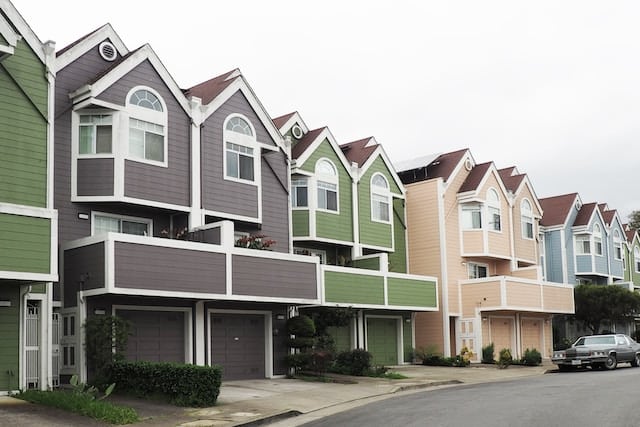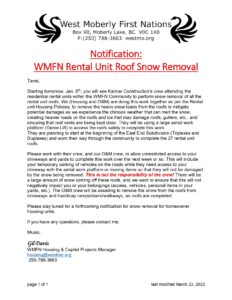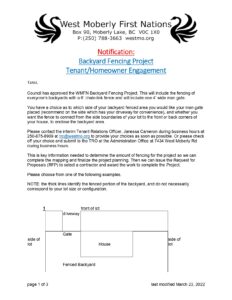Department /
Housing Department
Monday – Thursday: 8:00am – 4:30pm
Friday: 8:00am – 2:30pm, closed every other Friday
Saturday – Sunday: Closed
WMFN is dedicated to serving the best interests of its membership in building safety by moving forward with the highest standards of professionalism, competency, and consistent practice in the Housing Program.
Programs & Services
The WMFN Housing Department is responsible for the planning, organization, implementation and evaluation of the safe, reliable day-to-day operations and maintenance of a safe and healthy housing program and inventory for the WMFN members living on the West Moberly First Nations IR#168A. The Housing Dept. works diligently with all other relevant WMFN Departments necessary to achieve this goal.
A. Housing:
i. Programs:
- Nation Owned Rental Housing Program
- Rent-to-Own Program
- Nation Administered Mortgage Program
- Nation Secured Mortgage Housing Program
- Member Owned Housing Program
- Housing Maintenance Program
ii. ISC Housing Support Programs: eligibility requirements must be met to apply for funding
- New Construction subsidy – currently at max. of $121,294
- Renovations subsidy – currently at max. of $60,646
- Health & Safety Subsidy – currently at max. of $121,294 (certain conditions apply for upgrade to this level)
- Governance
iii. CMHC Housing Programs:
- Section 95 Social Housing subsidy – certain subsidy limits and interest rate apply and are revised annually
- Co-Investment Program
iv. Services:
- Housing Managment
- Housing Maintenance
- Housing Inspections
- Housing Renovations and/or Retrofits
- Fire Wood Contract
v. Implementation:
- Apply and enforce housing policy and associated housing Agreements
- Recommend housing policy changes and review housing goals and priorities (Annual review and revision)
- Maintain up to date list of housing applications using the following process
- Applications for:
a. On-Reserve Housing – Existing housing or new construction, major repairs and/or renovations
i. Applications are received and reviewed with the applicant by the Housing Manager, and the appropriate Housing Program is determined based off the information gathered during this application process. Applicant is put on the Wait List.
ii. Council is apprised of the Housing application
iii. The housing & Capital Projects Manager then proceeds to work on the file to obtain the necessary information to complete the following:
1. Budgets for overall project to completion and for following individual scopes of work:
a. Site Preparation:
i. Lot surveying if required
ii. Geotechnical Investigations
iii. Plot Plan
iv. Access
v. Lot Drainage
vi. Foundation site preparation
vii. Water Service into unit
viii. Sewer Service into unit
ix. Power into unit
b. Residential Unit:
i. Engineered Foundation
ii. Residential unit structure/building
iii. Inspections – All required building and electrical inspections
1. To meet funding requirements, all new construction and renovations require that all applicable building and electrical permits and inspections are completed, and copies submitted, including the Occupancy Permit as applicable:
a. Foundation preparation
b. Foundation
c. Structural Framing
d. Plumbing
e. Woodstove and chimneys
f. Electrical
g. Gas (natural gas or propane)
h. Sewage disposal
i. Final building inspection
c. Funding applications:
i. ISC HSP New construction subsidy
ii. CMHC S.95 subsidy
iii. Other funding programs as made available
d. Financing:
i. Banks
ii. ANTCO
e. Ministerial Loan Guarantees (MLG) application to ISC (process time; minimum 6 weeks)
2. Construction/Renovation Contract implementation
3. Ensuring all inspections are implemented as required, and if applicable that the Occupancy Permit is acquired
f. Off-Reserve Housing – Program to be developed
5. Manage selection process for WMFN housing
a. Dependent upon eligibility requirements and housing applicant’s capacity, needs and desires
6. Carry out or oversee maintenance and repairs in a cost-effective manner
7. Coordinate any required inspections
8. Research and implement housing best practices
9. Develop sustainable housing programs and projects
10. Monitor the effectiveness of all housing policies and programs
11. Provide information for tenants who require assistance in understanding and assuming their housing responsibilities
12. Respond within 20 days to tenant queries, requests for service, and complaints
13. Act as a liaison between tenants, administration, and Chief & Council
14. Provide regular reports to the WMFN Administration on financial status of all WMFN housing, current projects, and further applications regarding housing and capital projects
WMFN Housing Strategic Plan
Click the link below to view the PDF document.
Housing Programs
See policy section below for more program details.
- Nation Owned Rental Housing Program
- Rent-to-Own Program
- Nation Administered Mortgage Program
- Nation Secured Mortgage Housing Program
- Member Owned Housing Program
WMFN Rental Properties

Century 21
WMFN owned apartment buildings located in Chetwynd, BC are managed by Century 21 at current market rates. Please contact them if you are looking for housing in Chetywnd.
Frequently Asked Questions
a. How do I apply for housing?
i. As per the Housing Policies found on the WMFN website, you complete and submit a Housing Application to the Housing Manager, who will then book a meeting with the applicant to review their application and determine your housing needs and desires and help determine the best WMFN Housing Program to suit the applicant’s needs.
ii. Upon completion and approval of the application, the Housing Manager will notify the applicant’s Family Councillor and proceed with all necessary steps to make housing a reality for the applicant.
NOTE – Certain timing and availabilities may be beyond the Housing Manager’s ability to complete in as timely a fashion as they, or the applicant, want. All eligibility requirements and process steps must be met and completed in a particular process order and timelines set by other organizations than WMFN.
b. Where do I find Housing Applications?
i. If Housing Manager available, directly from the Housing Manager.
ii. If Housing Manager not available, ask Administration Reception who can provide application from file folder hanging on wall outside Housing Manager’s Office door.
iii. On the WMFN website – see link
c. Must I complete the Budget Analysis?
i. Yes, to accept a Complete Housing Application, the Budget Analysis must be completed, and proof of income must be supplied and verified, to be considered “Complete”.
d. Must I apply every year?
i. Yes, your application is only good for the calendar year in which it is submitted. Your application must be renewed or updated with the Housing Manager after January 1st of each year to remain valid on the Waiting List.
e. How long will it take to get a house?
i. It will depend on whether there is vacant existing housing available, or we need to complete new construction of a residential unit.
ii. New Construction will depend on lot availability and funding and financing availability and securement in each instance. There is a lot of work to plan and cost the project, apply for funding and financing, secure the required Ministerial Loan Guarantee for the financing, and develop the lot, construct the residential unit, complete the project, and obtain the Occupancy Permit for the applicant to sign their new Rental Tenancy Agreement or Mortgage Agreement and move into their new allocated residential unit. This can take several months or longer, so please apply as early as possible prior to wanting to move back to, or into a housing unit in the Community.
f. What funding is available to bring the cost of my new home down to affordable rent or mortgage levels?
i. ISC New Construction Subsidy:
1. Under the ISC Housing Support Program (HSP), the New Construction subsidy is currently at $121,294 and is meant for site preparation costs including, but are not limited to: grading, demolition, drainage, timber clearing, the addition of driveways, and the connection of services from the road to the new home depending on the capacity of the existing infrastructure services.
ii. CMHC Section 95 Housing Subsidy
1. Once all Housing Project Costs are determined, then the CMHC S.95 Budget Take Up Form can be completed which will determine what the annual and monthly subsidy amounts will be and what the required rent /mortgage payment amount will be. The Initial Allocated Section 95 Lifetime Subsidy Amount and Interest Rates are set by CMHC in May each year and will affect the final determinations as to the subsidy and Monthly Loan Payment.
a. I want to make alterations, additions, or improvements to my residential unit; How do I apply or receive approval?
i. If you are a Homeowner and are wanting to do the work yourself, or hire a contractor to complete the work for you:
1. Bring in your application and plan to the Housing Manager for review and approval (your contractor can attend meeting or attend an additional meeting later)
2. Your application and plan will be reviewed with you initially to discuss scope of work and workplan and timing
3. Your plan will also be reviewed by the Housing Maintenance Supervisor (also a qualified building inspector) to ensure that Building Code and WMFN Building Standards are being met
4. The Homeowner will be responsible for ensuring that all required inspections are completed as appropriate, and copies submitted to the Housing Manager for filing for your unit
5. If your plan includes electrical works, it will be reviewed by the Housing Maintenance Sr Assistant (a Red Seal Electrician) to ensure the workplan is appropriate
6. If your plan requires new circuits, you will need to hire an electrical contractor that can pull permits and arrange for electrical inspections as required – these costs are the Homeowner’s responsibility
7. All copies of electrical permits and inspection reports must be submitted to the Housing Manager for filing for your unit
8. If your plan includes works on your lot (Premises), the plan will be reviewed with Operations & Maintenance to ensure that there are no infrastructure impacts, and against the provisions of the Community Development Plan requirements for lot coverage and spacing
9. All copies of inspections must be submitted to the Housing Manager for filing for your unit
10. No works shall proceed until the Homeowner receives approval in writing form the Housing Manager
11. If you are a Tenant and are wanting to do the work yourself, or hire a contractor to complete the work for you, or want WMFN to complete the work for you
12. The same process outlined for Homeowners applies
NOTE – any alterations, additions or Improvements to the residential unit and premises become the property of WMFN and there will be no compensation or reimbursement to the Tenant for these works
b. I am supposed to get renovations every 20 years on my house; How do I know if I qualify?
i. Unfortunately, not all residential units are eligible for renovation funding programs from ISC or CMHC.
ii. ISC provides renovations funding via their Housing Support Program (HSP) in the BC Region to extend the structural and/or mechanical life expectancy of the home by at least 15 years, for on reserve Band Owned Rental units, Member Owned units, Band Administered Mortgage and Band Secured Mortgage units, but the unit must meet all eligibility requirements to qualify:
1. Unit must be at least 10 years old
2. Unit cannot have received renovation funding in last 10 years
3. Renovations cannot be for rodent/pest control
4. Renovations cannot be for aesthetic repairs
5. Unit cannot currently be under a CMHC S.95 Loan Agreement (WMFN Social Housing Program units) as these units are already subsidized for maintenance (Replacement Reserve Fund (RRF)) – once mortgage is paid in full and all CMHC Agreement conditions re met, then the unit may be eligible for renovations funding
6. Regular Renovations max. $60,646
7. Health & Safety Renovations max. $121,294
a. Health and Safety renovations should focus on building code deficiencies and remediating structural hazards in the home that pertain to the occupants of the home. A trained home inspector may be able to assist you to identify deficiencies or hazards in the main components of a structure in the foundation, electrical, plumbing, and egress.
i. An example of a Health and Safety renovation is a mould remediation as approved by an Environmental Health Officer at the First Nations Health Authority (FNHA).
*Note, non-structural remediation like “rodent-eradication” are not eligible.
b. Application must be accompanied by FNHA’s Environmental Health Officer’s (EHO) Report, Hazardous Materials remediation contractor qualification, and detailed construction cost estimate(s)
iii. CMHC provides funding under their RRAP, ERP and HASI funding Programs:
1. RRAP – Residential Rehabilitation Assistance Program max. $60,000
a. Inspection Report captures all work required to extend life of home by 15 years – takes approx. 1 month before Nation can solicit quotes
2. RRAP – Disability for Accessibility Repairs
a. RRAP-R must have been completed prior to RRAP-D can be approved and advanced
3. ERP – Emergency Repair Programs max. $30,000Emergency repairs only
a. No initial inspection required
b. Contractor quote and pictures must accompany application
4. HASI – Home Adaptations for Seniors’ Independence max. $20,000
a. For elders only (55+)
b. Contractor quote must accompany application
c. Can ISC and CMHC funding be combined for the same project?
i. New Home Construction Project
1. Yes, ISC new home construction funding and CMHC Sec. 95 new home construction funding can be combined for the same project. Some exclusions may exist depending on your agreement type.
a. ISC Eligible Funding for HSP Sec. 95 New Home Construction Project
i. ISC BC Region HSP subsidy amounts are set amounts based on the geographic and economic characteristics of a First Nation community per the Band Classification Manual: special access, remote, rural, or urban. The subsidy amount for new home construction is inclusive of building inspection costs.
ii. Renovation Project
1. Yes, ISC renovation funding and CMHC renovation funding can be combined for the same project. Eligible.
a. ISC Eligible Funding for HSP Renovation Project
i. HSP ISC funding provides a maximum subsidy per house for health and safety and regular renovations (half subsidy) and is inclusive of building inspection costs. Please note CMHC Sec. 95 homes that are currently under a CMHC Sec. 95 loan agreement are not eligible for Regular Renovation and Health and Safety Renovation HSP funding. The CMHC Sec. 95 Non-Profit Housing Program provides for maintenance and repair replacement reserves that a First Nation must manage throughout the life of the loan agreement.
d. How do I apply for renovations and repairs?
i. Emergency Repairs:
1. Emergency Repairs will be prioritized as a priority and will be taken care of as expediently as possible by the Housing Maintenance Dept during regular operating hours, or Operations & Maintenance staff after hours (on call 24/7 during non-operating hours, weekends, and Holidays) – see link
ii. Repairs:
1. Submit a Maintenance Request (MR) Form for regular repairs and maintenance on your residential unit – See Administration Reception or link
2. The MR will be reviewed by the Housing Manager and forwarded to the Housing Maintenance Supervisor to arrange for home visit to assess issue and provide cost estimate for repairs for approval by Housing Manager and Tenant/Homeowner
3. Tenants in Band Owned Rental or Social Housing units will have their repairs and maintenance covered by the Nation with the applicable funding (Own Source Revenues for Band Owned Rentals or Replacement Reserve Funds for Social Housing units)
4. Homeowners will be responsible for all repairs and maintenance costs. The Housing Maintenance Dept. can assist, but prior to any work being completed by Housing Maintenance or a third-party contractor, the Homeowner must agree to pay for costs upon completion or arrange for payment with Finance upon receipt of invoice
NOTE – Any repair items that is not normal wear and tear will be deemed to be Tenant Damages and will be the full responsibility of the Tenant to cover costs
5. Non- Emergency Repairs will be conducted on a priority basis, with Priority 1 being Health & Safety, Priority 2 being Code Compliance, Priority 3 being Asset Life Protection/Extension, and Priority 4 being Comfort/Cosmetic as per the WMFN Housing Maintenance Management Program – see link
iii. Major repairs/replacements:
1. Roofs
a. Funding may be available for units meeting eligibility requirements, please check with Housing Manager to confirm; otherwise, the Homeowner is responsible for costs to replace the roof as needed (expect every 15-35 years dependent upon type of roofing installed)
2. Hot Water tanks
a. Funding may be available for units meeting eligibility requirements, please check with Housing Manager to confirm; otherwise, Homeowner is responsible for costs to replace the hot water tank every 12 years (insurance requirement)
3. Furnaces
4. Funding may be available for units meeting eligibility requirements, please check with Housing Manager to confirm; otherwise, the Homeowner is responsible for costs to replace the furnace as needed
5. Doors and windows
6. Funding may be available for units meeting eligibility requirements, please check with Housing Manager to confirm; otherwise, the Homeowner is responsible for costs to replace doors and windows as needed
7. Cladding (exterior finish of house)
8. Funding may be available for units meeting eligibility requirements, please check with Housing Manager to confirm; otherwise, the Homeowner is responsible for costs to replace cladding as needed
iv. Renovations:
1. Submit a MR form for renovations based on information provided or obtained via a home inspection by WMFN or a third-party contractor
2. The Housing Manager will review the MR and determine if there is opportunity for renovations funding for the requested/recommended renovations
3. Where eligible, the Housing Manager will review the renovations with the Tenant/Homeowner to discuss the issue and potential funding and process
4. As applicable the necessary steps will be conducted to submit the application and supporting documents for the funding, and if approved and obtained, proceed with plans to implement the renovations, and complete all necessary inspections and reporting to complete the project
e. What Codes apply to WMFN Housing and Community Buildings?
i. Canada National Building, Plumbing and Fire Codes
ii. BC Building Code
iii. BC Electrical Code
Canadian Electrical Code adopted as B.C. Electrical Code
Canadian Electrical Code – link coming soon
iv. BC Plumbing Code
v. BC Fire Code
f. When is an inspection required?
i. All copies of inspection Reports and Permits must be submitted to Housing Manager to be put into your unit’s file for record keeping:
1. Site excavation and foundation preparation incl/ forms and footings, water and sewer lines, drainage, under slab plumbing, in slab heating, Radon Rough Ins plumbing, prior to pouring slab
a. Construction, repairing or altering a building or structure (structural components of the building or structure) incl:
i. Foundations
ii. Soil Gas
iii. Pre-Backfill
iv. Exterior walls framing and sheathing prior to any interior and exterior finish being applied
v. Insulation and vapour barrier
vi. Weight bearing interior walls
vii. Roofs
viii. Decks, landings, steps, and ramps
ix. Installation of any plumbing
x. Any electrical work requiring a permit from Technical Safety BC – the appropriate level certified electrician will verify if a permit is required
xi. Construction or replacement of a masonry fireplace or solid fuel burning appliance or a factory/masonry chimney
xii. Any installation or replacement/alteration for a gas (natural gas or propane) appliance
xiii. Any completion of sewage disposal system works
xiv. Final Inspections or Demolition
xv. To obtain an Occupancy Permit for new construction or renovations/repairs to a building or structure’s structural components
1. Does WMFN offer off-reserve Housing?
a. No. Currently, WMFN is exploring all avenues for the development of a WMFN Off-Reserve Housing Program
b. Currently, there is no to very limited funding available for off-reserve housing, but there are new opportunities forthcoming!
i. The federal and provincial governments are working on new models for Urban First Nations Housing programs and funding. We will update as we are able to.
ii. Council is committed in working towards an Off-Reserve Housing Program for its members, so please stay tuned!
1. The offices are closed and I need Housing Maintenance; What do I do?
i. After Hours Emergency Housing Maintenance. Please contact Darren Robertson.
2. My house is too big or small to meet my needs, can I get a more appropriately sized house?
i. Submit a Housing application to the Housing Manager and during application review meeting explain reason for need in change of housing request. The Housing Manager will be able to inform you if there is available housing to change to, or required process required to access new housing unit appropriate to need.
3. I have mobility/health issues and needs the access to and inside my unit improved; how do I apply for this?
i. Submit a Maintenance Request to the Housing Manager and during review meeting explain reason for alterations requested. The Housing Manager will be able to inform you if there is available funding for the required alterations and the required process required to obtain the necessary alterations. Eligibility requirements for funding must be met.
4. Can Housing Maintenance change my furnace filter?
i. This is the homeowner or Tenant’s responsibility as per the Housing Policy and Homeowner or Rental Tenancy Agreements. If you are an elder or disabled and cannot perform this yourself , or a family member cannot do it for you, the Housing Maintenance Department can complete this task for labour costs which must be agreed to prior to work performed, and paid upon completion.
5. Can Housing Maintenance change my light bulbs?
i. This is the homeowner or Tenant’s responsibility as per the Housing Policy and Homeowner or Rental Tenancy Agreements. If you are an elder or disabled and cannot perform this yourself , or a family member cannot do it for you, the Housing Maintenance Department can complete this task for labour costs which must be agreed to prior to work performed, and paid upon completion.
6. Can Housing Maintenance get me a new appliance?
i. If you are in a Band Rental unit or a Social Housing unit, and your appliance cannot be repaired, or repairs would cost more than replacement, then yes, we will replace the appliance for you.
ii. If you are a homeowner, then the cost of a new appliance is your responsibility, and if you cannot do so yourself, we can replace it for you, but costs must be agreed to prior to replacement and the invoice paid upon completion.
7. Can I get a loaner appliance?
i. If you are a homeowner, and you need a loaner appliance while your appliance is out for repairs, or you are waiting on a replacement, then yes, we can provide a loaner until your unit is returned or replaced. Please note that this is a short-term loan only. If time becomes unreasonable for the repair or replacement, then you may be invoiced for the cost of the loaner appliance, and you will need to pay for this appliance.
8. Can Housing Maintenance perform other tasks for me?
i. It would depend on the task and the availability of Housing Maintenance staff and workload. Priority work orders come first. If the task is not covered under a Housing Program service, then you must agree to the costs prior to the task being completed, at the timing of the Housing Dept., and you must pay the invoice upon completion.
9. Can Housing Maintenance assemble my new furnishings?
i. This is not the responsibility of the Housing Maintenance Dept. regardless of the Housing unit type you are in. But, as outlined above in other tasks, it could be performed for those in need of assistance, with costs being agreed prior to task performance, and paid upon task completion, at the timing availability determined by the Housing Maintenance Dept.
10. Can Housing Maintenance build me a woodshed, fence or storage shed?
i. This is not the responsibility of the Housing Maintenance Dept. regardless of the Housing unit type you are in. But, as outlined above in other tasks, it could be performed for those in need of assistance, with costs being agreed prior to task performance, and paid upon task completion, at the timing availability determined by the Housing Maintenance Dept.
11. Can I get my driveway plowed and/or sanded?
i. The driveway snowplowing and sanding is the responsibility of the Operations & Maintenance Dept., and they have a contractor who performs this task anytime there is an accumulation of 3” or more of snow, and sanding during icy winter conditions. Only those on the Elders and Disabled List will have their steps and walkways shovelled and sanded.
12. Can I get my lawn mowed?
i. The Summer Lawn Maintenance Program is an Operations & Maintenance Dept. program, and only those on the approved list of Elders, Disabled, Dingle Parents, and SA client List will have their lawns maintained. Timing of this service not weekly, but on the rotational basis dependent upon the size and capacity of the Summer Lawn Maintenance Crew each year.
13. Can I clear trees, brush, and vegetation from around my lot?
i. No, you cannot remove, clear, or alter trees, shrubs, bushes, and vegetation that is not on your lot. Only that which within the surveyed boundaries of your allocated lot.
14. I am the Manager, or worker of a WMFN Dept. and I need building maintenance, can Housing Maintenance come fix the issue?
i. No. Community Building Maintenance is the responsibility of the Operations & Maintenance Dept. All Maintenance Requests must be submitted by the Dept. Manager to the O&M Manager.
Housing Department Staff

Gil Davis
Housing Manager

Coy Gammon
Sr. Housing Maintenance Assistant

Cody Bougerolle
Maintenance Supervisor

Jazmine Desjarlais
Tenant Relations Officer

Dustin Gauthier
Jr. Housing Maintenance Assistant


